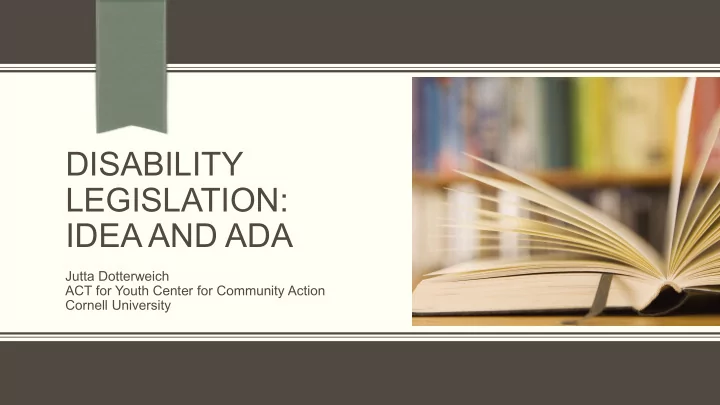

DISABILITY LEGISLATION: IDEA AND ADA Jutta Dotterweich ACT for Youth Center for Community Action Cornell University
Complementary to… Training manual: http://bit.ly/inclusive-program-environments
Presenter Jutta Dotterweich Director of Training ACT for Youth Center for Community Action Cornell University www.actforyouth.net Contact: jd81@cornell.edu
Objectives Why is it important to know about ADA and IDEA? Overview of IDEA and ADA legislation What are accommodations? Implications for youth programs Resources
WHY WOULD IT BE BENEFICIAL FOR YOUTH WORKERS TO KNOW ABOUT DISABILITY LEGISLATION?
Benefits: Understanding legislation… Fosters a new vision for creating inclusive environments for youth and recruiting a diverse population of youth. Prepares staff to accommodate youth. Youth with disabilities may participate in youth programs without disclosing their disability, but may need special support at times. Prepares program planners and staff with the knowledge that youth with disabilities have certain rights and can ask for accommodations. Identifies need for organizational self-assessments, revising program and organizational practices, and building staff capacity.
Defining Disability A disability is any condition of the body or mind (impairment) that makes it more difficult for the person with the condition to do certain activities (activity limitation) and interact with the world around them (participation restrictions). Disabilities can be Physical Learning Sensory Mental health condition Developmental Health condition Intellectual https://www.cdc.gov/ncbddd/disabilityandhealth/disability.html
Important Disability Legislation Individuals with Disabilities Education Act (IDEA) • Discrimination Protect Americans with Disabilities • Abuse Act (ADA) • Additional services Provide • Accommodations
Accommodations An accommodation is essentially any strategy that overcomes or lessens the effect of a specific barrier. A barrier is an obstacle that may exist in school, at the workplace, in the community, or in one’s own home. Accommodations: Changes to facilities Special services Creative thinking and problem solving
Individuals with Disabilities Education Act (IDEA) Ages: Birth – 21 Thirteen Categories: Autism, Deaf-blindness, Deafness, Emotional Disturbance, Hearing impairment, Mental retardation, Multiple disabilities, Orthopedic impairment, Other health impairment, Specific learning disability, Traumatic brain injury, Speech or language impairment, Visual impairment
IDEA Impact on Education Free public education Quality instruction Testing to establish needs and services Individual education plan (IEP) Specialty support or accommodations Accommodations can include Verbal instructions Visuals Additional test time
Committee on Special Education (CSE) CSE meetings to set goals and review progress CSE Members: Teachers Parents Agency representatives knowledgeable of the young person Youth, especially when considering postsecondary goals
Americans with Disabilities Act (ADA) A person qualifies as having a disability if they meet one of the following: A physical or mental impairment that substantially limits one or more major life activities A record of such impairment A perception by others as having an impairment
American with Disabilities Act (ADA) Prohibits discrimination on the basis of disability in: Private sector employment Activities of states and local governments Places of public accommodation Transportation Telecommunication services ADA National Network - https://adata.org/ https://adata.org/factsheet/ADA-overview
Accommodations and Disclosure Accommodations are provided only when a person discloses his or her disability and requests accommodations Disclosure is not mandatory, but needed when asking for accommodations Decision to disclose belongs solely to the person with a disability
Implications for Youth Programs Youth with disabilities participate in youth programs without staff knowing about their disabilities OR Youth participate in youth programs exhibiting behavior issues; youth/parents may or may not disclose disabilities and ask for accommodations OR Youth with physical/sensory/health disabilities want to participate in youth programs and ask for accommodations
Ways to Accommodate Young People Create a structured, predictable environment Create a positive program climate Use universal design for learning (UDL) Reframe your behavior perspective www.actforyouth.net/youth_development/professionals/inclusive-environments.cfm
Make Accommodations Youth with physical/sensory/health disabilities want to participate in youth programs and ask for accommodations Steps to consider: Organizational assessment Organizational commitment Facility/program modifications
Reasonable Accommodations (Reasonable) accommodations are modifications to policy, rules, or the physical environment that enables individuals to enjoy equal benefits of program, work or services. They are not considered reasonable if they represent “undue burden” or fundamentally alter the program
Resources IDEA - https://sites.ed.gov/idea/ National Council on Disabilities: IDEA reports https://ncd.gov/publications/2018/individuals-disabilities-education-act-report-series-5- report-briefs US Department of Justice: Information and Technical Assistance on the Americans with Disabilities Act - https://www.ada.gov ADA National Network - https://adata.org The 411 on Disability Disclosure Workbook - http://www.ncwd-youth.info/411-on- disability-disclosure National Consortium on Leadership and Disability for Youth (NCLD-Youth) http://www.ncld-youth.info/index.php?id=01
NYS Resources Northeast ADA Center (at Cornell University) - http://www.northeastada.org/ NYS Special Education - http://www.p12.nysed.gov/specialed/ NYS Justice Center for the Protection of People with Special Needs - http://www.justicecenter.ny.gov/ NYS Disability Services Council - http://www.nysdsc.org/ Office for People with Developmental Disabilities - https://opwdd.ny.gov/ Independent Living Centers Directory, NY - http://www.ilru.org/projects/cil-net/cil-center- and-association-directory-results/NY YOUTH POWER! - http://www.youthpowerny.org/
History of Disability Advocacy National Consortium on Leadership and Disability for Youth. Disability History Timeline: http://www.ncld- youth.info/Downloads/disability_history _timeline.pdf Museum of disAbility History Buffalo, NY http://museumofdisability.org/
Recommend
More recommend